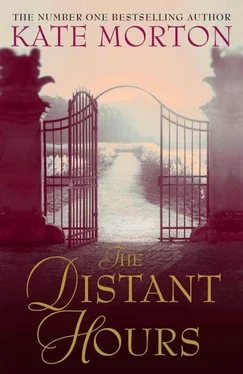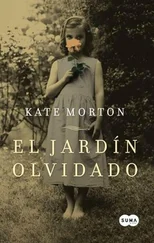‘ Ah! ’ She winced, sucked her finger then shook it quickly. ‘Steam,’ she said, blowing lightly across her fingertip. ‘It’s this silly new kettle.’
‘Can I fetch you some ice?’
‘I’ll just run it under cold water.’ She turned on the tap. ‘It’s something in the shape of the spout. I don’t know why they keep redesigning things that work perfectly well already.’
I took another breath, but let it out again as she continued talking.
‘I wish they’d just focus their attention on something useful. A cure for cancer, perhaps.’ She turned off the tap.
‘Mum, there’s something I really need-’
‘I’ll be right back, Edie; let me take your father his tea lest the bell begin to toll.’
She disappeared upstairs and I waited, wondering what I was going to say, how I was going to say it, whether it was possible to phrase my sin in such a way that she might understand. A fond hope, but I dismissed it swiftly. There is no kind way of telling someone you’ve been peeking through the keyhole at them.
I could hear the edges of the low conversation Mum was having with Dad, then his door closing, then footsteps. I stood quickly. What was I thinking? I needed more time; it was foolish just to rush in; a little thought would make all the difference – but then she was in the kitchen saying, ‘That ought to keep His Nibs happy for the next fifteen minutes,’ and I was still standing somewhat awkwardly behind my chair, as natural as a bad actor in a play.
‘You’re off already?’ she said, surprised. ‘You haven’t even had your tea.’
‘I, ah…’
‘You were saying something, weren’t you?’
I picked up my teacup and studied the contents closely. ‘I…’
‘Well?’ She tightened the belt of her robe, waiting for me, the merest hint of concern narrowing her eyes. ‘What is it?’
Who was I kidding? More thought, a few additional hours: none of it was going to change the facts. I let out a sigh of resignation. ‘I have something for you.’
I went back up to my room and collected the letters from beneath my bed.
Mum watched my return, a slight crease in her brow, and I laid the box on the table between us.
‘Slippers?’ She frowned lightly, first at her slipper-clad feet, then at me. ‘Well, thank you, Edie. One can never have too many pairs.’
‘No, but you see, they’re not-’
‘Your gran.’ She smiled suddenly, a distant memory firing. ‘Your gran used to wear this type.’ And the look she gave me then was so unguarded, so unexpectedly pleased, that it was all I could do not to seize the lid from the box and declare myself the ghastly traitor that I was. ‘Did you know that, Edie? Is that why you bought them? It’s a wonder you could still find the old-’
‘They’re not slippers, Mum. Open the box; please, just open it.’
‘Edie?’ An uncertain smile as she sat in the nearest chair and pulled the box towards her. She offered me a last wavering glance before turning her attention to the lid, lifting it and frowning at the pile of discoloured envelopes within.
My blood ran hot and thin, like petrol beneath my skin, as I watched the emotions flit across her face. Confusion, suspicion, then the intake of breath heralding recognition. Later, as I ran the memory over in my mind, I could pinpoint the precise instant at which the scrawled handwriting on the top envelope metamorphosed into a lived experience. I saw her face change, her features adopting, once more, those of the almost-thirteen-year-old girl who’d written the first letter to her parents, telling them about the castle in which she’d found herself; she was there again, caught in the original moment of composition.
Mum’s fingers rested on her lips, her cheek, then hovered above the soft indentation at the base of her throat, until finally, after what seemed an age, she reached tentatively into the box, withdrew the pile of envelopes and sat holding them in both hands. Hands that were shaking. She spoke without meeting my eyes. ‘Where did you…?’
‘Rita.’
She released a slow sigh, nodded as if she’d been given the answer to something she should have guessed. ‘How did she come by them? Did she say?’
‘They were with Gran’s things, after she died.’
A noise that might have been the start of a laugh, wistful, surprised, a little bit sad. ‘I can’t believe she kept them.’
‘You wrote them,’ I said softly. ‘Of course she kept them.’
Mum was shaking her head. ‘But it wasn’t like that… my mother and I, we weren’t like that.’
I thought of The Book of Magical Wet Animals . My mother and I weren’t like that either, or so I’d thought. ‘I suppose that’s what parents do.’
Mum fumbled envelopes from the pile, fanning them out in her hands. ‘Things from the past,’ she said, more to herself than to me. ‘Things I’d worked so hard to put behind me.’ Her fingers lightly traced the drift of envelopes. ‘Now it seems no matter where I turn…’
My heart had begun to race at the promise of revelation. ‘Why do you want to forget the past, Mum?’
But she didn’t answer, not right then. The photograph, smaller than the letters, had fallen loose from the pile, just as it had the night before, slipping onto the table. She inhaled, before lifting it higher, rubbing her thumb across its surface; the expression on her face was vulnerable, pained. ‘Such a long time ago, yet sometimes…’
She seemed to remember then that I was there. Made a show of tucking the photograph back amongst the letters, casually, as if it meant little to her. She looked directly at me. ‘Your gran and I… it was never easy. We were very different people, we always had been, but my evacuation brought certain things to the fore. We fought and she never forgave me.’
‘Because you wanted to transfer to grammar school?’
Everything seemed to freeze then, even the natural circulations in the air stopped their swirling.
Mum looked as if she’d been struck. She spoke quietly, a quaver in her voice: ‘You read them? You read my letters?’
I swallowed; nodded jerkily.
‘How could you, Edith? These are private.’
All my earlier justifications dissolved like flecks of tissue in the rain. Shame made my eyes water so that everything seemed bleached, including Mum’s face. Colour had dissolved from her skin, leaving only a splatter of small freckles across her nose so that she looked like her thirteen-year-old self. ‘I just… I wanted to know.’
‘It’s none of your business to know,’ Mum hissed. ‘It’s got nothing to do with you.’ She seized the box, clutched it tightly to her chest, and after a moment’s indecision hurried towards the door.
‘But it does,’ I said to myself, then louder, my voice trembling, ‘you lied to me.’
A stumble in her step -
‘About Juniper’s letter, about Milderhurst, about everything; we did go back – ’
The slightest hesitation in the doorway, but she didn’t turn and she didn’t stop.
‘ – I remember it.’
And I was alone again, surrounded by that peculiar glassy silence that follows when something fragile has been broken. At the top of the stairs a door slammed shut.
A fortnight had passed since then, and even by our standards relations were icy. We’d maintained a ghastly civility, for Dad’s sake as much as because it was our style, nodding and smiling but never speaking a word that wasn’t of the ‘Please pass the salt’ variety. I felt guilty and self-righteous in turn; proud and interested in the girl who loved books as much as I did, angry and hurt by the woman who refused to share the merest part of herself with me.
Most of all though, I regretted having told her about the letters. I cursed whoever it was that said honesty was the best policy, turned a keen eye back to the letting pages, and fed our cold war by making sure I was barely around. It wasn’t difficult: the edits for Ghosts of Romney Marsh were under way so I had a perfectly valid reason for putting in long hours at the office. Herbert, for his part, was pleased to have the company. My industry, he said, reminded him of the ‘good old days’ when the war had finally ended, England was getting back on its feet, and he and Mr Brown were rushing about acquiring manuscripts and filling orders.
Читать дальше












